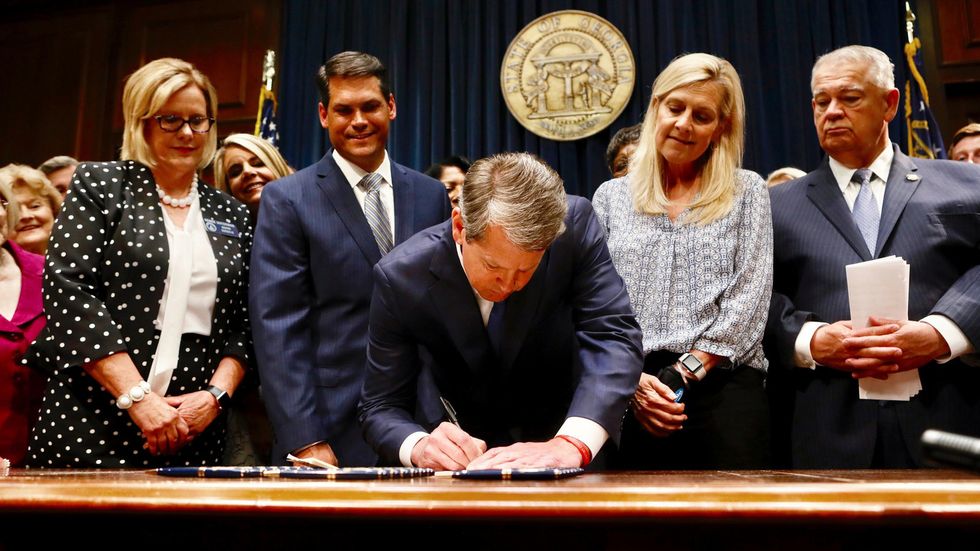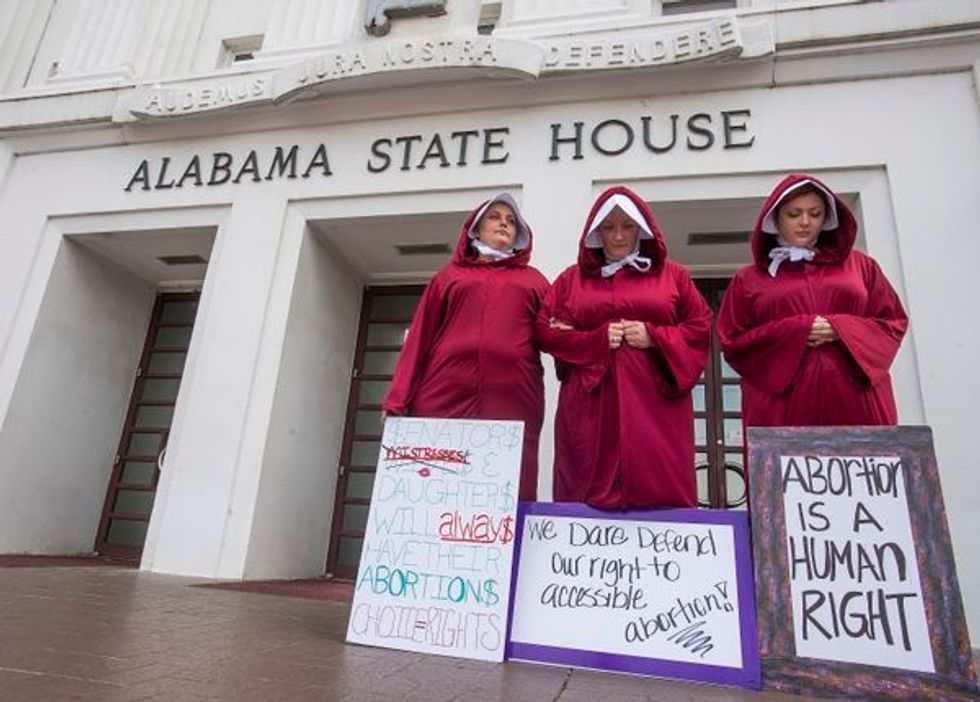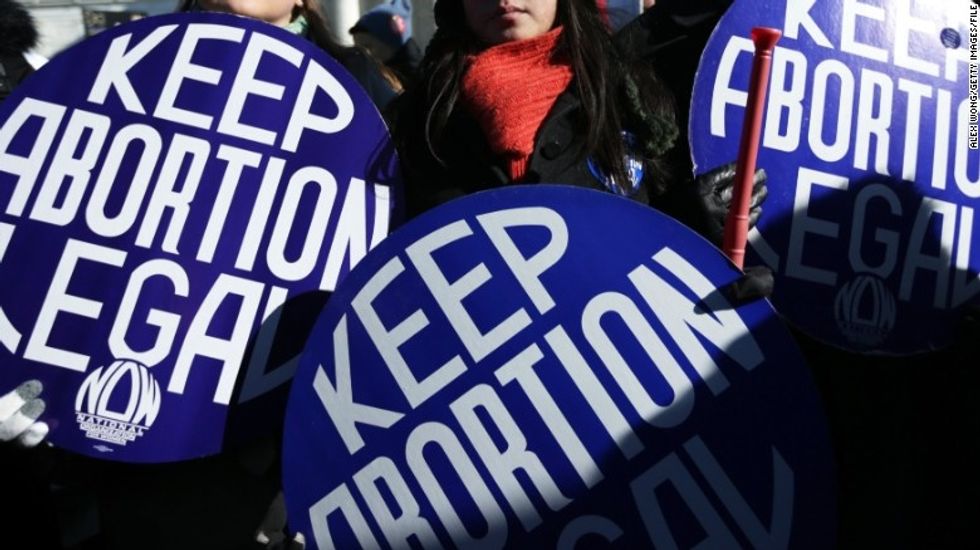On May 7, 2019, abortion after six weeks was outlawed in Georgia.
Georgia Governor Brian Kemp signed into law a bill that bans abortion after cardiac activity in the fetus can be detected. This milestone is reached at the 5-6 week period of pregnancy, a time when most women do not even know they are pregnant. This type of bill is commonly (and incorrectly) referred to as a "heartbeat bill." It prohibits abortion at a stage when the fetus' heart is not yet formed, instead it depends on the cardiac activity of the fetal tissue. The Georgia law includes an exemption that would allow the procedure to be performed if it would save the mother's life. The Georgia law also includes an exemption for pregnancies that are a product of rape or incest.
Fetal heartbeat bills are popping up in state legislatures all over the country.
Georgia, Ohio, Kentucky, and Mississippi have all passed laws that ban abortion after cardiac activity is detected. In recent years, Iowa, North Dakota, and Arkansas have all passed "fetal heartbeat" laws, but they have been struck down in court. Kentucky's law was struck down earlier this year.
The Alabama Senate voted Tuesday to send the most restrictive abortion bill in the nation to the Governor's desk.
Alabama has gone beyond the fetal heartbeat bill by passing a law that will make performing an abortion at any stage of pregnancy a felony. Alabama Governor Kay Ivey signed the bill into law on Wednesday after the Alabama Senate voted 25-6 to pass it. The law makes it possible for doctors who perform an abortion to face life in prison. Similar to the Georgia law, the Alabama law includes an exemption for abortions based on "reasonable medical judgment." However, the Alabama law does not include an exemption for pregnancies that resulted from rape or incest.
The Missouri Senate passed a version of the fetal heartbeat bill last Thursday.
The bill, also known as the "Missouri Stands for the Unborn Act," bans abortions after 8 weeks of pregnancy with exceptions for medical necessity, but not for pregnancies that result from rape or incest. The bill will go back to the Missouri House for a vote, which is controlled by Republicans, before going to the desk of Missouri Governor Mike Parson (R) for signature. It will no doubt face a legal challenge.
The 1973 United States Supreme Court Case Roe v. Wade made abortion legal in all 50 states, but that decision is more in danger now than ever before.
SCOTUS ruled in favor of the appellant, Jane Roe, in a 7-2 decision. The majority decision focused on the right to privacy found in the fourteenth amendment to the Constitution and recognized in the case Griswold v. Connecticut. The decision viewed abortion as a private decision made by a doctor who is exercising their professional discretion in treating a patient.
The new laws could force a showdown with the United States Supreme Court.
Pro-life groups openly express the idea that new anti-abortion laws break with the precedent set by Roe v. Wade The main purpose of these laws is to open up an avenue to overturn the 1973 decision. Ohio Right to Life President Mike Gonidakis said, "The heartbeat bill is the next incremental step in our strategy to overturn Roe v. Wade." The bill in Ohio has already been legally challenged by the ACLU and Planned Parenthood. The Alabama law is being legally challenged by the Alabama Women's Center and the ACLU of Alabama. These cases could be appealed all the way up to the Supreme Court, which is the goal of this legislation.
Roe v. Wade has been the topic of political conversation for years. So, why now?
With the controversial confirmation of Supreme Court Justice Brett Kavanaugh to the Supreme Court, replacing Justice Anthony Kennedy (often thought of as a swing-vote, including abortion cases) conservatives hold a solid 5-4 majority on the bench. The Supreme Court is not the only place in the judiciary where Trump has left his mark, Republicans have been quietly confirming conservative judges to serve at all levels of the federal court systems. This has emboldened pro-life groups to pursue legislation that places tight restrictions on abortions, with the hope that they may be upheld and Roe v. Wade will be overturned. The states passing these laws are also under complete GOP control as they are classified as "Republican trifectas" (states where the legislatures and governorship are all controlled by Republicans).
The threat to Roe v. Wade is real, but most Americans still agree with the original decision.
According to the Kaiser Family Foundation, 67% of Americans do not want to see Roe v. Wade overturned. These laws do not represent the will of the American people, nor of the founders of the United States. Yet, Louisiana, Mississippi, North Dakota, South Dakota, Arkansas, Kentucky, and Tennessee all have passed "trigger laws" that would immediately ban abortion following the overturning of Roe v. Wade. Nineteen states currently have state laws or supreme court rulings that would protect abortion rights, and more are looking to pass protections as safeguards.
The new laws expose the lack of support for rape survivors in America.
The Alabama and Missouri laws do not allow them to get abortions and they are forced to give birth to their rapist's child. Worst of all, under the new law, doctors in Alabama who perform an abortion face the same maximum sentence as first-degree rape offenders. Under Missouri's new abortion law, doctors could get up to 15 years in prison for performing an abortion, while second-degree rape carries a maximum sentence of seven years and/or a fine of $5,000. While many women do not report their rapes because of the stigma and shame surrounding the issue (and a variety of other reasons), it is possible that their doctors could be policed more harshly than their rapists.
American women deserve better.
After all, it is proven that outlawing abortion does not decrease the abortion rate, it only increases the likelihood that the procedure will be done unsafely. Make no mistake that restricting or outlawing abortion only serves to hurt women by putting them at risk for fatal injuries incurred from unsanitary conditions. We should be progressing towards improving the health of American women and increasing access to reproductive healthcare, instead of undoing almost five decades worth of progress. These laws are unconstitutional, and they are a threat to the rights and safety of all American women.






















